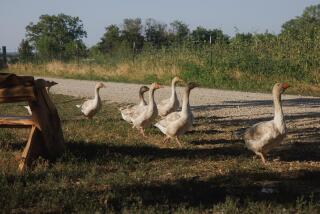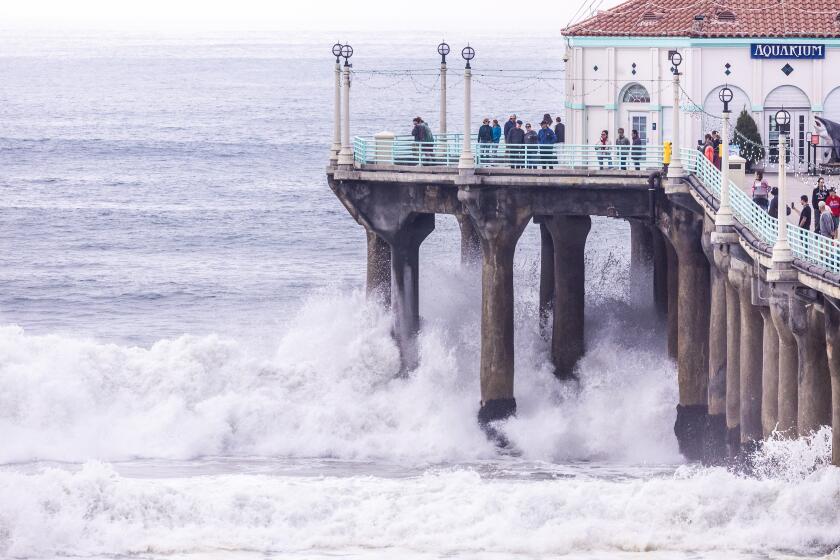Physician Says Holiday Bird Is an Environmental Turkey
Wait! Before you carve any more leftover turkey, consider this: Gobbling that bird may be hazardous to the environment.
To be “ecologically in tune,” physician Michael Klaper says you should scrap that turkey in favor of a yummy wild rice casserole. It’s more healthful, he preaches, and it makes sense environmentally.
According to the good doctor, preparing the casserole requires a fraction of the land, water and energy needed to raise and market turkeys.
Wait a minute, you interrupt. Abandon turkey, a tradition in your house since your ancestors beached their boats near Plymouth Rock? Can’t do it!
Nonsense, says Klaper, a well-known author in vegetarian circles. He argues it’s time to throw out old eating habits and adopt new ones. We must forsake our meat-based diet in exchange for one chock full of fruits, vegetables and whole grain goodies--pasta, breads and rice--not merely to improve the body but, more important, to help “heal the Earth,” he says. It’s a 1990-ish kind of thing to do, largely because the Earth’s environment is in sad repair, Klaper says.
“Mother Nature is waving red flags all over,” the Seattle physician said in an interview before lecturing recently in Huntington Beach. “Our topsoil is eroding, our water is polluted and being wasted and our atmosphere is breaking down because of the large-scale production of animal flesh.
“We can’t keep doing it. We have to change a lot of things--the fuel in our cars, our energy sources and our mode of transportation. And we’ve got to change our diet.”
Persuasive stuff, but try telling that to a confirmed meat-eater dining at a hamburger haven.
“When I’m hungry, which happens about five times a day, I want a cheeseburger, the kind that oozes juice,” said Mike Hardy, a burly Costa Mesa patio installer as he launched into his second quarter-pounder at McDonald’s this week.
“I start my day at 6 in the morning, and by lunchtime I want something with substance,” he said between mouthfuls of burger. “I’m in no mood for sprouts and tomatoes between slices of wheat bread. I’m for the environment, but I’ve got to eat.”
Klaper, a general practitioner, concedes winning converts to his way of thinking will take time--lots of it.
But he has plunged full time into selling his theories at lectures and in books. He is the author of “Pregnancy, Children and the Vegan Diet” as well as “Vegan Nutrition: Pure and Simple.” Television is the next conduit as he and his partner, John Robbins, author of the Pulitzer Prize-nominated “Diet for a New America,” seek to spread their message about diet and the environment to a wider audience.
Klaper and Robbins, the one-time heir to the Baskin-Robbins ice cream fortune, teamed up two years ago, about the same time Robbins started the EarthSave Foundation, a nonprofit environmental education group. What intrigued Klaper were Robbins’ warnings about the damaging effects that the average meat-based diet inflicts upon nature. A vegetarian for more than a decade, the 40-year-old Klaper understood the health benefits of a diet structured around fruits and vegetables. But Robbins was one of the first to suggest that livestock and poultry production was ruining the environment by using a disproportionate amount of natural resources, a concept that made sense to Klaper.
Today, Klaper is the foundation’s science director, and when he isn’t tending to patients, he is talking down meat and talking up the nutritional and ecological value of salads, soy pancakes and pasta.
He rattles off statistics like a machine gun: A 10% reduction in meat consumption--about two meals a week--would free up enough land to raise grain to feed 60 million people. On average, it takes about 3 1/2 acres of land annually to produce food for a meat eater, but less than half an acre to feed a vegetarian.
To produce a pound of wheat requires about 25 gallons of water. A pound of beef requires more than 2,500 gallons, he said.
“Therefore, to raise and manufacture the beef in a standard fast-food burger takes about 800 gallons of water, about the equivalent of what the average Southern Californian uses in a month,” Klaper said. “Is that environmentally sound?”
Klaper contends that 90% of all the grains grown in this country are fed to animals, and the amount of land used by the meat and poultry industry--including grain fields, grazing land, even the property used by slaughterhouses and processing plants--covers an area about the size of the western United States. By comparison, all the grains, vegetables and fruits consumed in this country and exported are grown in an area roughly the size of Vermont, Missouri and Arkansas.
Equally disturbing, Klaper said, is the loss of 60% of the nation’s forests over the last 300 years, much of it to create pasturelands for livestock grazing. Cutting down tens of thousands of trees contributes to the gradual warming of the Earth, the so-called “greenhouse effect,” by depleting a primary source of oxygen, he said.
Shifting our diet, Klaper asserted, is the remedy. If the demand for meat-based products falls off, cattlemen and chicken ranchers will be forced to convert their lands to wheat, rice or vegetable production. Klaper even suggested a federal subsidy to support ranchers who switch to farming.
But one beef industry official said Klaper’s idea is “sadly wanting for evidence.”
“For whatever reason, we are a constant target for these type of people,” said John Ross, executive vice president of the California Cattlemen’s Assn. Consumers are once again buying beef after a 15-year decline in sales, he pointed out. “Beef in moderation is an important part of any diet, and to suggest that we are at the core of all the world’s environmental ills just doesn’t make sense.”
Ross added that much of the range land used for grazing is unsuitable for crop production.
“A lot of it is steep hillsides or rocky ground,” he said. “It’s OK for grazing, but you can’t grow on it.”
Turkey producers also were ticked at Klaper’s attack. Industry officials point out that 254 million pounds of turkey were produced last year in the United States, a 40% increase over 1982 and a hefty indicator that Americans are sticking with that holiday classic.
“They may be eating less red meat, but not turkey,” said Laurie Wilson, National Turkey Federation spokeswoman. “We’re all concerned about the environment, but I don’t think a lot of people will be switching to wild rice casseroles any time soon.”
More to Read
Sign up for Essential California
The most important California stories and recommendations in your inbox every morning.
You may occasionally receive promotional content from the Los Angeles Times.










